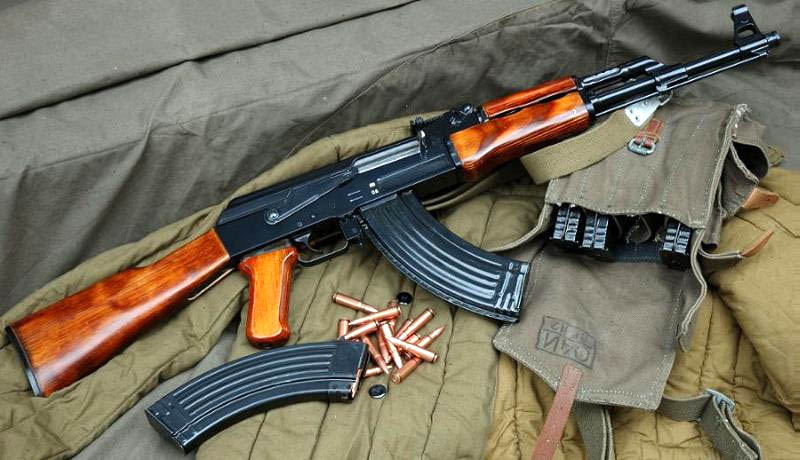January 7, 2014

What might have been for agriculture? It’s never possible to walk back to the fork in the road, but looking at the life of Mikhail Kalashnikov, father of the AK-47, the temptation to rearrange pieces of history is overwhelming.
Kalashnikov, creator of the AK-47 rifle — often labeled as the gun that’s killed more people than any other in history — died aged 94 in December 2013 in his native Russia. He leaves behind approximately 100 million AK-47s spread out across every war zone and hellhole on Earth. Find conflict and be sure — AK-47s are in use. Mozambique has an AK-47 on its national flag; even the terrorist group Hezbollah features an AK-47 on its banner.
At age 18, Kalashnikov was drafted into the Red Army, trained as a tank driver and was wounded in 1941 by a German shell at the Battle of Bryansk. From The Independent: “A soldier in the bed beside me asked: ‘Why do our soldiers have only one rifle for two or three of our men when the Germans have automatics?’ So I designed one. I was a soldier and I created a machine gun for a soldier.”
See related: Nazis and Russians tangled in seed bank history
He did just that, finishing his brilliantly simple design in 1947. The Automatic Kalashnikov-47, with its light weight, durability, minimal parts and ease of operation, was a military masterpiece with no equal. With a somewhat short barrel it lacked long range efficiency, but could wreak havoc at short range or in tight conflicts — capable of semi-automatic or automatic fire. From Bloomberg: “Probably the most important feature of Kalashnikov’s design was the loose fit of the gun’s moving parts. As he described it, ‘all the elements are spaced out, as if they are hanging in air.’ Later, when he demonstrated the weapon, he would sometimes pour sand into the firing mechanism and the AK-47 still would not jam.”
Blog archive
Big Data is agriculture’s big blank on the map
Benchmark GM crop contamination case a bitter tale
How to create an epic environmental disaster
Kalashnikov was born to make something; possessing a mind for design and invention. But if not the AK-47, then what? A day after his death, Bloomberg ran a short piece titled Kalashnikov Should Have Made Farm Tools and the words beg the “What might have been?” question.
War, agriculture, destiny
Kalashnikov was born in Siberia in 1919, the 17th of 19 children in a peasant family. But during Joseph Stalin’s collectivization of agriculture, the Kalashnikov land was swallowed up in 1930. His father was labeled a class enemy and the entire family was sent packing in a cattle car. In short, Stalin’s collective farming policy ensured that Mikhail Kalashnikov and agricultural innovation would never merge.
Instead, Kalashnikov went on to create the most famous gun in the world. Over the last two decades of his life, Kalashnikov was often condemned and blamed for the losses related to his AK-47 creation. But Kalashnikov never tolerated such criticism, although his view changed as he aged: “It is not my fault that the Kalashnikov became very well known in the world, that it was used in many troubled places. I think the policies of these countries are to blame, not the weapons designers,” he told The Independent.
From Izvestia: “Let the politicians who start wars sleep badly. The designer is not to blame.”
From Business Insider: “I didn’t put it in the hands of bandits and terrorists, and it’s not my fault that it has mushroomed uncontrollably across the globe. Can I be blamed that they consider it the most reliable weapon?”
And yet, Kalashnikov recognized the fragile circumstances of his early life: "If it wasn't for war, I would have been doing machines to help agriculture - so it was Germans who forced me to invent it," he told the Siberian Times.
At 93, Kalashnikov wrote a letter to the head of the Russian Orthodox Church, torn by guilt: “My spiritual torment is unbearable. One and the same question: if my rifle killed people does that mean that I, Mikhail Kalashnikov, 93 years of age, the son of a peasant, Christian and orthodox by faith, am responsible for people’s deaths, even if they were enemies?”
For more on Kalashnikov's letter, see Kalashnikov expressed guilt over assault rifle invention in letter to Church
What might have been? Maybe Kalashnikov was thinking back to his lost family fields when he was quoted in 2002: “I would prefer to have invented a machine that people could use and that would help farmers with their work …”
Follow me on Twitter: @CBennett71 or email me: [email protected]
* Photo courtesy of Wikimedia Commons, Valio Subaru
Blog archive
Tom Seaver — pitcher’s mound to wine ground
What treasure is buried beneath farmland?
Farmer suicide and the road to agricultural ruin
Gun control and agriculture clash over homemade pistol
Farmland hides mobster for 10 years
What are the greatest agriculture breakthroughs in history?
Oil tankers, not icebergs, a water scarcity solution?
Harold Hamm, sharecropper to oil and fracking tycoon
The myth of the aging US farmer
Pig farmer replays Deliverance with repo men
Where is one-fifth of the world’s fresh water hiding?
You May Also Like




